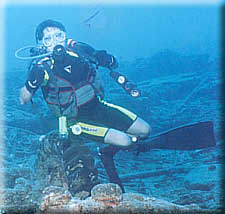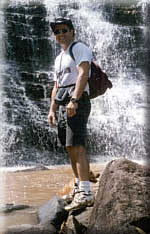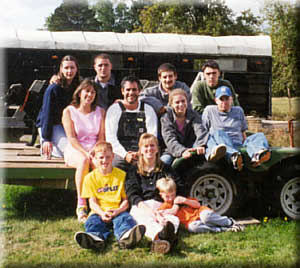Adventurer Chooses Dr. Vallieres and Life
Impressed. It describes most people who have met or known Matt Scott. Whether it's because he effortlessly repaired someone's car, because - after only four years experience - he can handle horses with a seemingly magic touch, or because he seems to carry his church on his back, people marvel at what he can do. He shows a firm and caring devotion to his children with which parents empathize, and for a man who quips that he began living at age 40, he seamlessly blends youth and a magnanimous maturity to which people respond warmly.
He is a man who managed to find work at the Puget Sound Naval Shipyard as a limited welder, welding high pressure plates in 1989, and rose through the ranks, avoiding layoffs when they came. He is a man who, independent of a network or an apprenticeship, took the necessary night classes, passed the mandatory tests and attained the required qualifications to do the impossible and rise to general foreman in less than 11 years -- a shipyard record. He continued to dazzle his superiors, performing so well that he earned the select position of multi-trade supervisor -- eligible to serve as foreman over other workers not in his own field -- and was hand-picked to oversee submarine tender repair in Guam, where, in his spare time, he made 30 dives in those few months alone, excluding the other cold water dives he made in Washington that year.
He is a man who can no longer scuba dive. He is a man who can no longer train horses. He is a man who can no longer help out at his wife's "Mom'n'Pop" Belfair Cafe. He is a man who can no longer sleep peacefully or retain food he has eaten.
THE ADVENTURES COME TO A HALT

In July of 2001, Matt began feeling especially run down; in August he visited the infirmary at the Puget Sound Naval Shipyard, and the doctor there diagnosed wheezing. Matt went for a more comprehensive evaluation at Group Helath Cooperative of Puget Sound in Washington where he was diagnosed with allergies, prescribed suitable medication and sent on his way. The medication did nothing, so he stopped taking it. By September, his rib cage was unusually sore, and minor wheeziness was evolving into increasingly difficult breathing. He finally returned to Group Health on September 25 and had a chest x-ray; Dr. Alan Searle, his primary physician, found a moderate left pleural effusion. Matt's chest cavity was, so to speak, leaking. The examining pathologist, Dr. Michael Cook, recommended a CT scan.
On September 27, 2001, Matt had a CT scan, confirming the pleural effusion and clearly showing collapse of the left lung; the base of Matt's left lung had ceased to function. The doctors were mystified as to what was causing the symptoms.
On September 28, Dr. Searle requested a thoracentesis; an 18-gauge catheter was inserted into Matt's back. About 450 ccs of colored, but clear fluid were withdrawn and sent to pathology for analysis, and Matt was prescribed erythromycin in case of pneumonia as well as Tylenol and ibuprofen for the pain.
On October 1, Matt discussed the incoming results of the pathological report with Kathleen Thomas, a physician's assistant at the clinic. She advised him that while the cells in the pleural fluid were atypical, they were not cancerous. Further immunohistochemical staining at the pathology lab, however, revealed something entirely different.

On October 5, after a referral from Dr. Searle and a confirming diagnosis from Dr. Samuel Hammar of Diagnostic Specialties Laboratories at Harrison Memorial Hospital in Bremerton, Washington, Matt Scott sat down with Dr. Ann Williams as she explained to him what his new and confirmed diagnosis of malignant pleural mesothelioma meant. Matt had been hoping that he might still be able to receive some good news, some further treatment, and then be able to return to his daily routine of work at the shipyard, exercise and maintenance work on Judy's Belfair Cafe. Dr. Williams told him anything but that.
HAUNTING MEMORIES OF A FATHER
Matt learned of the median survival rate for patients like himself. He learned what potential treatment options were available to him. He learned that mesothelioma was closely linked to asbestos exposure. His father had suffocated to death almost twenty years before from asbestosis, after just retiring from a career as a pipecoverer. Matt's father had gone quickly but suffered much, and Matt remembered how much time he had spent around his asbestos-covered father.
Matt can recall that he "was all over Dad. He was always lifting me and goofing around with us two boys." One instance stood out for Matt. "Mom was brushing [Dad] off with a broom, I was about four years old and was using my hands to help. She told me to get out of there because I was getting all dusty."
Matt knew then that a fate similar to his father's was staring him in the face. All his exercise, all his strength, all his commitment to his family and those around him, all his faith seemed to pale in comparison to this tumor that was growing inside him and rapidly encasing his lung, crushing it, and suffocating him.
AN OPTION TO LIVE
Dr. Williams could understand the fear that Matt was facing. She also understood that he needed to seek aggressive therapy from an experienced surgeon in as little time as possible. She referred him to Dr. Eric Vallieres, a renowned thoracic surgical oncologist at the University of Washington Medical Center. A member of the Science Advisory Board of the Mesothelioma Applied Research Foundation ( MARF), a 501(c)(3) non-profit charity whose mission is to eradicate mesothelioma as a life-ending disease, Dr. Vallieres is one of the foremost treaters of mesothelioma in the nation.

Dr. Vallieres examined Matt on October 8, and found that Matt qualified for his most aggressive treatment plan: multi-modality therapy, a medley of chemotherapy, surgery and radiaton.
The surgery is the premier treatment available today in the field of mesothelioma treatment -- an extra-pleural pneumonectomy. In it, Dr. Vallieres removes the patient's affected lung and pericardial sac and replaces the old, pericardial sac with a new one made of Kevlar®.
In mid-October, Matt began his chemotherapy. As he said, "[It] looks like nausea and night sweats are going to be a part of life for right now." He finished up his first round of therapy, and began his next two-week round on Monday, November 12, in an effort to shrink the tumor and secure as much of a chance for a successful surgery as possible.
For now, all Matt can do is rest. His superiors at the shipyard tell him that he can come in whenever he wants. He is, however, subject to his weakened body's whims. He has lost 20 pounds from his 181-pound frame, and he spends a great deal of his time nauseated. Breathing, alone, is a chore; work is impossible. If he cannot get into work to remain on the payroll, and if he cannot attend his continuing-education classes, he will lose his hard-earned qualifications and his livelihood.
REBUILDING A LIFE
In addition to not being able to work for himself, Matt could no longer cook or perform the necessary plywood and sheetrock work for Judy's cafe. Between that and the time that Judy has had to spend with him, Matt and Judy lost the cafe. Additionally, Matt could no longer assist Horse Rescue Mission, a program for which he and Judy raise funds to retrain and rehouse abused and neglected horses. Jobs that once took Matt a day now take a week. Jobs that took a week now take several months. Matt is slowing down, and the world is not.

Also fading are their plans for a house. Matt and Judy were going to build their first house together and already had plans that were engineer-stamped in June. By now, they should have been laying the foundations, having received the permits in September. Permits, however, expire, and as changes in Matt's body demolished a concrete timetable for construction, Matt and Judy indefinitely postponed obtaining permits to actually build.
Jereme, Matt's stepson and also a long-time dive partner, has helped out enormously in the past weeks despite his own work schedule. Matt worries about his daughter, Alisha, and Judy's son, Griff. Both in their late teens, they are taking these recent developments especially hard.
Matt remains humble, thankful for all the support he has received from family, friends and distant well-wishers. He feels blessed that he was able to enjoy Christmas services with his church family and then a dinner with his family at home. He is trying to help Judy in any way that he possibly can with the yard and her rental properties, but he is the first to admit that his strength is still greatly diminished.
Matt finished up his fourth round of chemotherapy in late January and has been trying to work at the shipyard, so that he won't have to reimburse coworkers or the yard for sick leave wages or time. However, with his health, he can only squeeze in three to four days a week of work, and after that, he spends his entire weekend in bed. He is complaining of chest/heart pain and is suffering from fatigue. He has a numbness in his legs, and he has just been battling a small bout with flu. He is taking Vicodin for the pain, and his sweats have returned. Provided his CT scans from this February showed good news, he will undergo the extra-pleural pneumonectomy; it's his only shot at life. He is worried because his pleura thickened between his third and fourth rounds of chemotherapy. He will consult with Dr. Williams and Dr. Vallieres shortly. He focuses on his treatment and his family and reminds others of a date in the future: "Remember that we will need to have a special birthday party on August 8, 2031."
On that day, God willing, Matt will celebrate his seventy-fifth birthday. We will keep you posted on this amazing man's progress.
*** POSTED MARCH 18, 2002 ***
An Update -- 7/23/02
Matt had a terrible Fourth of July. In fact, most other days in July haven't been very good either. He completed a seven-week regimen five radiation treatments per week in the beginning of July, and when we spoke with him on July 23, he was still pushing through the pain. Matt is taking OxyContin and Prednisone to alleviate the pain, as well as approximately eight other medications deemed necessary to help him through this agonizing recovery. Radiation left Matt with third-degree burns on his back, and he cringes imagining what the treatment inflicted on him internally.
He can barely work anymore, nausea haunts him all day, every day, and he force-feeds himself to preserve what little strength remains. Judy stays at home with him to take care of him, and other members from his church rallied around Matt during his radiation treatments, some even driving the distance to Tacoma to ensure that Matt made his appointments. It was a small sacrifice in their eyes to keep this man with them as long as possible.
Matt's weight still falls short of normal, and his voice is hollow and cracked. When asked what he feels most these days, he replies, "Tired." We will keep you posted on the progress of this faithful man.
An Update -- 9/9/02
Matt's recovery from his March 18, 2002 surgery has been long and slow. The burns from the radiation treatments have finally healed. Matt has not yet been able to return to work. He is still on a significant amount of pain medication from which the doctors have been weaning him slowly. He says he spends most of his days resting trying to gain back the strength and vigor he once possessed. The good news is that his appetite is improving. He is now only scheduled for follow-up visits with his oncologist every three months, and at six month intervals with Dr. Vallieres.
An Update -- 6/30/03
Today was a good day for Matt Scott. In fact it was so good he was considering a horse ride. He's had to switch to a more gentle horse for his rides because his old horse "Romeo" was too wild. Matt continues his weekly treatments with Carboplatin/Cisplatin. He has completed his radiation therapy but sadly reports that much damage was done to his heart. The location of his tumor was such that the heart could not be protected. In hindsight Matt says he feels he may have been better off doing without the radiation but at the time was only doing what he felt would prolong his life. He has managed to maintain his weight. His shortness of breath has increased dramatically, he can't walk half a block without gasping for air. He states that during each month, he gets 8 or 9 good days. It's then that he's able to help with things like watering the plants. Judy takes care of everything else, he adds. "She's a trooper". He takes comfort in the thought that he is approaching his two-year survival mark. Though he feels his health is declining he maintains his will to fight this demon within.
For Matt and Judy, maintaining a postive attitude is not a mere abstraction. They know the importance of keeping a strong immune system. They know that each tiny stress accumulates and can overload the immune system, creating a more fertile ground for the advancing tumors. One insult that can hardly be termed "tiny" is the proposed Asbestos Trust Fund bill (SB. 1125), which is being pushed by Sen. Hatch and the asbestos tortfeasors. Matt and Judy think about this bill and the devastating emotional and financial impact it will have on other mesothelioma patients and their families who have not yet resolved their legal claims. Matt and Judy can only shake their heads in disbelief. "How," Matt asks, "can my government take this radical step to shelter the evil companies who have made by life a godforsaken nightmare?"
An Update -- 10/17/03
Matt states he is "actually feeling better than I have in a long time. I can't really remember the last time I felt this good." He completed Carboplatin and Cisplatin treatments that unfortunately did not effect the tumor. The tumor has grown slightly. Matt is scheduled to meet with Dr. Eric Vallieres on October 29, 2003 to determine if there is another chemotherapy drug that can be tried.
Matt met fellow mesothelioma patient Paul Douglas who has been receiving Onconase.
Mr. Matthew Scott passed away on July 5, 2004


